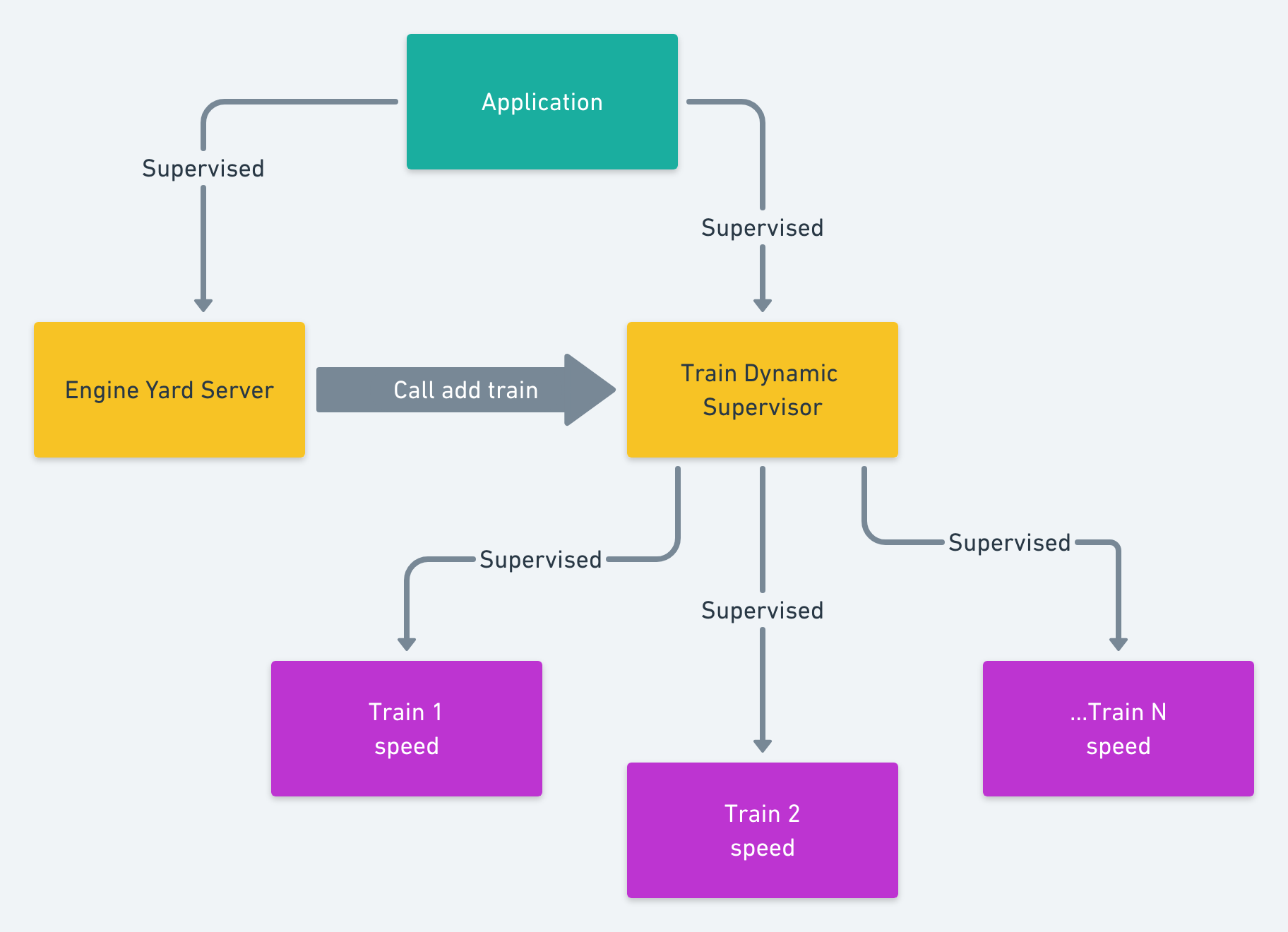Here's an example of a dynamic supervision tree in Elixir/OTP. Say we have an application that tracks trains in a fleet. We have the following topology:

Since on a given day different trains will be active, we want to be able to dynamically add and remove processes for them to the supervision tree.
defmodule Yard.Server do
use GenServer
@moduledoc false
def init(args) do
{:ok, args}
end
def start_link(opts) do
GenServer.start_link(__MODULE__, %{}, name: __MODULE__)
end
# -----------------------------------------------------
# Client
# -----------------------------------------------------
def add_train(args) do
GenServer.call(__MODULE__, {:add_train, args})
end
# -----------------------------------------------------
# Server
# -----------------------------------------------------
def handle_call({:add_train, args}, _from, state) do
start_status = Yard.TrainSupervisor.add_train(args)
{:reply, start_status, state}
end
end
defmodule Yard.TrainSupervisor do
use DynamicSupervisor
def start_link(_arg) do
DynamicSupervisor.start_link(__MODULE__, :ok, name: __MODULE__)
end
def init(:ok) do
DynamicSupervisor.init(strategy: :one_for_one)
end
def add_train(id) do
child_spec = {Yard.Train, id}
DynamicSupervisor.start_child(__MODULE__, child_spec)
end
def remove_train(pid) do
DynamicSupervisor.terminate_child(__MODULE__, pid)
end
end
defmodule Yard.Train do
use GenServer
def init(id) do
{:ok,
%{
id: id,
speed: nil
}}
end
def start_link([], id) do
start_link(id)
end
def start_link(id) do
GenServer.start_link(__MODULE__, id, name: {:global, "train:#{id}"})
end
# -----------------------------------------------------
# Client
# -----------------------------------------------------
def get(pid) do
GenServer.call(pid, :get)
end
def update_speed(pid, speed) do
GenServer.cast(pid, {:update_speed, speed})
end
# -----------------------------------------------------
# Server
# -----------------------------------------------------
def handle_call(:get, _from, state) do
{:reply, {:ok, state}, state}
end
def handle_cast({:update_speed, speed}, state) do
new_state = Map.merge(state, %{speed: speed})
{:noreply, new_state}
end
end
Next, we add the Yard server and the Train Supervisor to the application supervision tree:
defmodule Yard.Application do
@moduledoc false
use Application
def start(_type, _args) do
children = [
Yard.Server,
Yard.TrainSupervisor
]
opts = [strategy: :one_for_one, name: Engine.Supervisor]
Supervisor.start_link(children, opts)
end
end
Now when we fire up iex -S mix we can add trains and update their speeds:
iex> {:ok, pid} = Yard.Server.add_train("A13")
PID<0.2342.0>
iex> Yard.Train.get(pid)
{:ok, %{id: "A13", speed: nil}}
iex> Yard.Train.update_speed(pid, 65)
:ok
iex> Yard.Train.get(pid)
{:ok, %{id: "A13", speed: 65}}
If a train process crashes, it will be restarted by the TrainSupervisor. In another post, I'm going to look at how to maintain state across crashes.